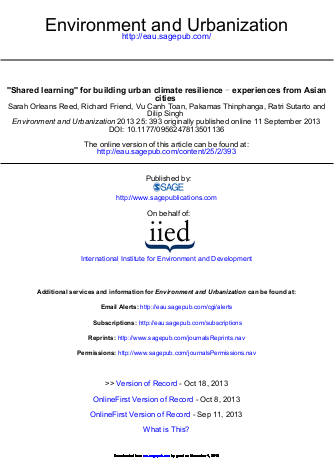
This paper considers how resilience thinking and, in particular, its emphasis on learning has been applied in 10 cities in Vietnam, India, Thailand and Indonesia. Applying a “shared learning” approach in the Asian Cities Climate Change Resilience Network (ACCCRN) has helped to create or strengthen networks, build appreciation for complexity and uncertainty among stakeholders, provide a space for deliberating concepts such as vulnerability and resilience, and build knowledge and capacities for stakeholders to engage and represent their own interests. Shared learning approaches face considerable challenges navigating politicized urban environments, in which the nature and value of existing systems − and therefore the value of building resilience − are contested. This article suggests that deliberate, strategic intervention by facilitators may contribute to more transformative change on behalf of equitable, socially just outcomes – and thus cautions against seeing urban climate vulnerability as a technical challenge, or shared learning as a “toolkit” for building resilience.
Resource collections
- Accountability to affected populations (AAP)
- Climate emergency
- Topics
- UN Habitat - Urban Response Collection
- Urban Response - Urban Crisis Preparedness and Risk Reduction
- Urban Response Collection - Community Engagement and Social Cohesion
- Urban Response Collection - Economic Recovery
- Urban Response Collection - Environment and Climate Change
- Urban Response Collection - Housing, Land and Property
- Urban Response Collection - Urban Crisis Response, Recovery and Reconstruction
- Urban Response Collection - Urban Resilience
